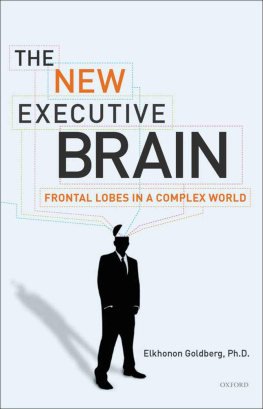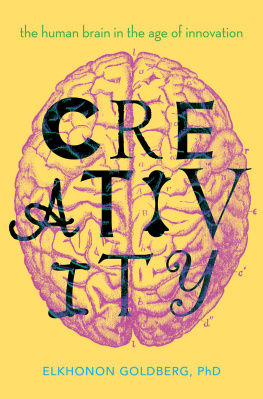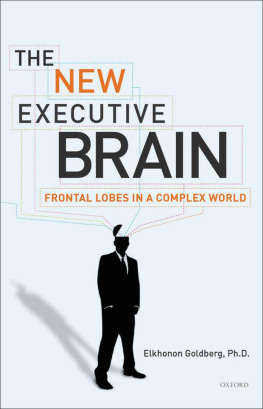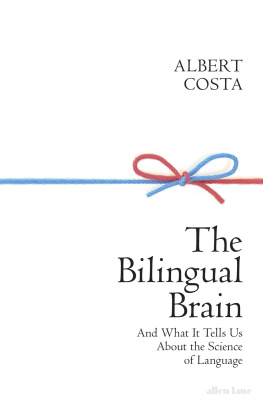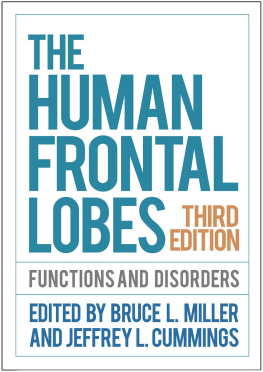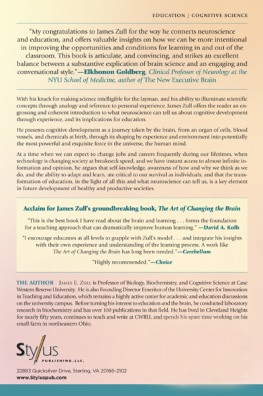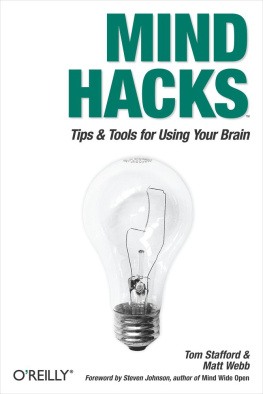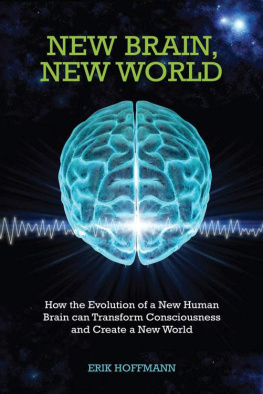THE NEW EXECUTIVE BRAIN
Also by Elkhonon Goldberg
The Executive Brain: Frontal Lobes and the Civilized Mind
The Wisdom Paradox: How Your Mind Can Grow
Stronger As Your Brain Grows Older
THE NEW EXECUTIVE BRAIN
Frontal Lobes in a Complex World
Elkhonon Goldberg

OXFORD
UNIVERSITY PRESS
Oxford University Press, Inc., publishes works that further Oxford Universitys objective of excellence in research, scholarship, and education.
Oxford New York
Auckland Cape Town Dar es Salaam Hong Kong Karachi
Kuala Lumpur Madrid Melbourne Mexico City Nairobi
New Delhi Shanghai Taipei Toronto
With offices in
Argentina Austria Brazil Chile Czech Republic France Greece
Guatemala Hungary Italy Japan Poland Portugal Singapore
South Korea Switzerland Thailand Turkey Ukraine Vietnam
Copyright 2009 by Elkhonon Goldberg.
Published by Oxford University Press, Inc.
198 Madison Avenue, New York, New York 10016
www.oup.com
Oxford is a registered trademark of Oxford University Press
All rights reserved. No part of this publication may be reproduced, stored in a retrieval system, or transmitted, in any form or by any means, electronic, mechanical, photocopying, recording, or otherwise, without the prior permission of Oxford University Press.
Library of Congress Cataloging-in-Publication Data
Goldberg, Elkhonon.
The new executive brain : frontal lobes in a complex world / Elkhonon Goldberg.
p. ; cm.
Includes bibliographical references and index.
ISBN: 9780195329407
1. Frontal lobes. 2. Neuropsychology. I. Title.
[DNLM: 1. Frontal Lobephysiology. 2. Brain Diseasesphysiopathology. 3. Mental Processesphysiology. WL 307 G618n 2009]
QP382.F7G653 2009
612.825dc22
2009006253
9 8 7 6 5 4 3 2 1
Printed in the United States of America
on acid-free paper
To my mentor and friend Alexandr Luria
Acknowledgments
My thanks go to Oxford University Press for ensuring the success of The Executive Brain and thus laying the ground for The New Executive Brain. My editor Craig Panner, assistant editor David DAddona, and production editor Lynda Crawford, as well as the copy editor Jerri Hurlbutt, were all superb with their combination of a soft touch and a firm hand at every stage of my work on The New Executive Brain. Dmitri Bougakov has again been most helpful with numerous technical aspects of the book. Michael Carlisle was a source of wise advice on numerous issues, including the books title. Nicholas (Colly) Myers kindly agreed to critically review the manuscript and his comments and insights are greatly appreciated. Richard Gallini provided the artwork for the book with patience and insight. Jeffrey Donaldson provided invaluable help with references. Larry Abbott, Sigurd Ackerman, Robert Bilder, John Caronna, Michael Cole, Colby Collier, Anna DiStefano, John Fawcett, Cecilia Gamburg, John Garland, Brian King, Lisa King, Sergey Knazev, Alex Martin, Allan Mirsky, Ralph Nixon, Peter Palmer, Kenneth Podell, Silvana Riggio, and Daniel Sodickson have provided valuable input. My dog Brit has been my constant and most agreeable companion throughout the process, never judgmental and never demanding, unless hungry.
I am particularly grateful to Vladimir and Kevin for giving me an opportunity to learn from their conditions; to those called Toby and Charlie as well as L. H. and S.F. for sharing their life stories and allowing me to describe them in this book; to Kevins father for allowing me to write about his son; and to Robert Iacono for sharing his experience with cingulotomy.
I dedicate this book, as one before, to the memory of my mentor and friend Alexandr Romanovich Luria.
E. G.
New York, N.Y.
Contents
Foreword
We live in an increasingly complex and bewildering world of fast change and unprecedented problems. Leaving aside the familiar, long-term issues relating to global warming, the more acute anxiety in the mind of many must surely be the scary and uncharted waters, at the time of writing, of the current economic crisis. Why should a financial meltdown be of any direct relevance to brain research? Interestingly enough, President Obama has suggested that there may be psychological factors at worknamely, greed and recklessness. Whilst the brain mechanisms underlying such quintessentially human traits would always have been of interest, surely there has never been a time quite like this, when the subject takes on a still sharper focus.
Perhaps its no surprise, however, that Elkhonon Goldbergs book does not set out with the goal of solving the global recession, nor indeed of explaining how a particular mind-set might have contributed to it. Rather the journey on which he is about to take you, is towards a new perspective on one of the biggest remaining mysteries within the brain, a mystery that will fascinate not just the neuroscience cognoscenti in the field, but anyone curious to understand the human mind, especially at the moment.
You are about to uncover some of the secrets of the frontal lobes of the brain. These large areas, occupying as they do almost a third of the total outer layer of the human brainalmost twice as much as our nearest primate relative the Chimpanzeepresent a real puzzle. We have known for a long time that, when damaged, the patient seems remarkably unaffected, at least with regard to basic functions of movement and the senses: the most famous example of frontal lobe damage occurred in the nineteenth century when a premature ignition of explosive drove a four-foot long iron rod through the temples of one Phineas Gage. As became apparent over the subsequent few months, the problem resulting from such damage was far from immediately obvious: a subtle change in character where, for example, the individual becomes far more distracted by the here and now, and far less concerned with consequences.
But since the hypo-frontal syndrome is just that, a complex array of behaviors, the frontal lobes have become a kind of kitchen sink for many brain researchers, where virtually any sophisticated function that one wanted to house in a particular brain region could be obligingly accommodated by the frontal lobes: whatever a subject or patient might be asked to do, the frontal lobes would inevitably light up, i.e. show activation in brain scans. This issue, the seduction of brain imaging techniques, and the misleading, misplaced simplicity of interpreting them is well articulated by Elkhonon. We see that, convenient though it might be to think of the brain in a modular fashion composed of centres for this or that sophisticated function, such thinking is as outdated as the old phrenology of the nineteenth century.
In this book, youll discover a whole new take on how to tackle the problem of the frontal lobes. A helpful clue with which we start is to see that not only have the human brains in evolution undergone exaggerated expansion but, as so often in biology, such evolution is reflected in personal development with the frontal lobes not coming fully active until the third decade of life. Occupying, as it does, such as large part of our grey matter, yet at the same time, relatively irrelevant in early childhood, what could the frontal lobes be doing? Elkhonon shows how we cannot think of brain areas as independent mini-brains, but rather as massively interlinked with each other. As it happens, the frontal lobes are more connected to all other parts of the brain than any other region: hence we see how this sophisticated area is at the same time more sensitive and vulnerable in a whole host of diverse brain disorders ranging from neurological diseases to more subtle conditions such as schizophrenia and ADHD. There is even a recent, intriguing report showing a negative correlation with frontal lobe activity and Body Mass Index!
Next page
